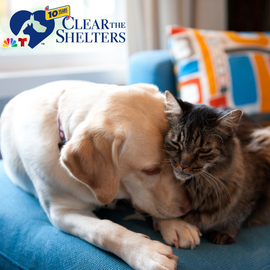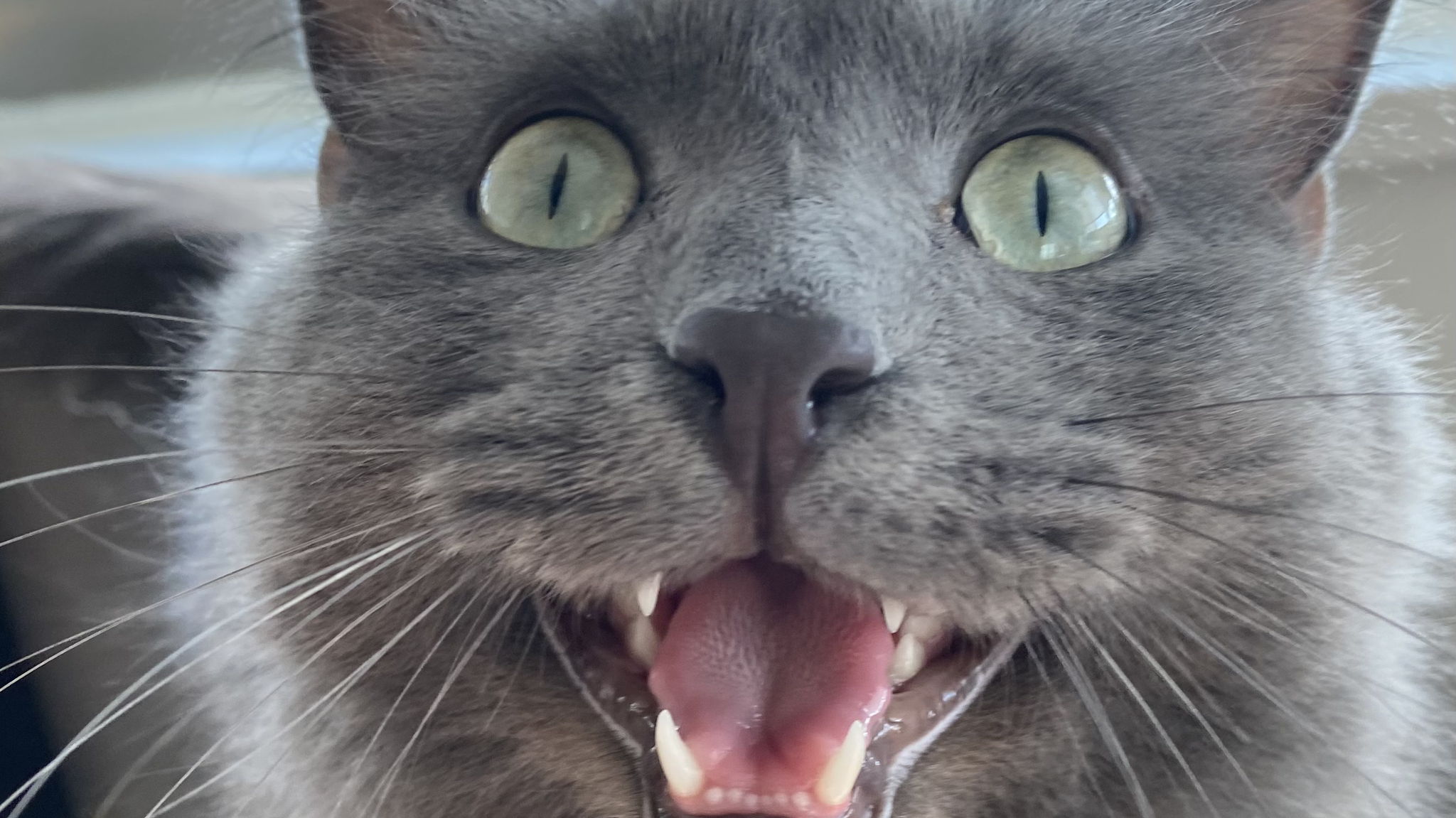Routine for Cats
Why A Routine?
By Rebecca Sweat
CATS Magazine, November 1987
Mouser knows she’s going to get a fresh bowl of water and her favorite brand of cat food when I wake up in the morning. After breakfast and once again after dinner, we take a brisk walk together. During my lunch break, Mouser and I spend about 10 minutes tossing cat toys. She knows how much attention to expect on a typical day, what a normal household noise level is, and where she can go for peace and quiet if she needs it.
Schedules Count
What seems like a boring existence to us is a routine that means safety and security for a cat. By setting up regular, unchanging timetables and procedures for daily events, pet owners provide an environment that’s dependable, predictable and organized.
“Cats like it when their owners follow a consistent routine because their own routines aren’t interrupted,” says Dr. Mark Biehl, DVM, owner of the College Station CatClinic in Wheaton, Illinois. “Cats are creatures of habit. They tend to wake their owners up about the same time each morning because they want to be fed. Cats have a good internal clock [and] know when their owners are getting up, when they’re going to leave for work, and when they’re going to come home again.”
Routines are great stress-busters for pets. “When there’s a lot of change in routines, cats tend to become anxious and nervous,” says Edward McGinnis, DVM, president of the Chicago Veterinary Medical Association. “Pets, as with people, like stability.” Too much change can cause stress-related problems in your cat, such as digging, chewing, biting, scratching, excessive licking, an unwillingness to use the litterbox or aggression toward you and your family.A cat who suddenly starts behaving badly is probably reacting to a change in the household or cat care routine. “
An example would be the [person] who had been staying at home during the day and then goes back to work. Maybe the owners moved to a new home or brought home a new baby. Or it could be that they’re doing a lot more entertaining or socializing than they had in the past,” Dr. Biehl says. “Commonly when you break up the cat’s normal routine, you run into behavioral problems.”
Some of the most important routines for your cats are how often and when you play and exercise together, the consistency of your pet’s diet, regular mealtimes, the normal noise and activity level in your household, morning and evening rituals for your family and cat, and being consistent regarding what behaviors you do and don’t tolerate in your cat.
While all cats need routines, they’re especially important for very young, elderly or sick cats. A new cat or kitten will be more likely to bond with you and your family if you establish consistent routines from the beginning.
“A new pet must adjust to unfamiliar people and different surroundings, and if you’re constantly changing how things are done at home, you have a very confused animal,” Dr. McGinnis says. “Established routines help pets learn to trust their owners because they know what to expect.”
With elderly cats, routines are important because of the stress factor. “An older animal is probably dealing with a lot of health problems, their senses and organs may be failing, perhaps their eyesight is deteriorating, and any changes to the household routine just adds more stress,”emphasizes Dr. McGinnis. Older cats will appreciate a routine of sleep, exercise and regular emotional contact with their humans. The stress of change can promote illness in mature cats and make unhealthy cats sicker.
Routines are helpful for pet owners, too. Set aside the time on your day’s “to-do” list or plan a regular day on your weekly calendar to change the litter, groom your cat, buy cat food, etc., and there will be a greater chance that these tasks will be completed.
“Establish a grooming routine early on in the cat’s life, [and] she’ll learn to enjoy grooming and you won’t have to struggle with your cat to get it done,” says Sheldon Rubin, DVM, a Chicago veterinarian and author of Practical Guide to Cat Care.
Regular routines also are an excellent way to be aware of you cat’s health needs. “If you interact with her on a regular basis—feed her twice a day rather than leave out food all the time, clean her ears once a week—this helps you key-in to [her]health,” Dr. Rubin says. “You will come to expect certain behaviors in your cat because of the routine.” If the cat’s behavior changes, you’ll know very early-on that there’s a problem. For instance, when you call kitty and she doesn’t come or her ear has an unusual smell or discharge, you’ll know she may be sick and need medical attention.
Making Routines Work
Once you’ve established a routine, stick to the schedule as much as possible.Carefully evaluate which of kitty’s habits you want to reinforce and be consistent in how you interact with her. For example, what time do you want your cat to get used to being fed each morning? “If you have an adult cat and you want to sleep in on Sundays, you shouldn’t immediately get up as soon as you hear her moving around in the morning,” states Barbara Stein,DVM, founder and director of the Chicago Cat Clinic. Giving in and getting her food right away will put her in the habit of getting you up at 6 a.m. or earlier. Likewise, if you don’t want your cat waking you up and begging for food in the middle of the night, you shouldn’t reward her meows by getting up and opening a can of food.
Perhaps the most important routine to your cat, next to feeding time, is the frequency of interaction you have with each other. Regularly play with your cat twice a day, even for only five minutes at a time, and your cat will begin to look forward to and even depend on your time together. When you acquire a new cat, take an honest look at your schedule and figure out how much time you’ll be able to spend with her on a regular basis.
“People often give their cat a lot of attention when it’s a young kitten, but then the newness wears off and the cat gets ignored,” Dr. Stein says. “The adult cat still wants attention.” Set aside a certain amount of time to spend with your kitten when she’s new to your household, and retain that level of interaction throughout her life.
Anticipating Changes
Of course, there are times when you can’t stick to your routine or when it has to change,such as during a visit from out-of-town guests, when you go on vacation or introduce a baby or spouse to the household. Kitty will have the easiest time adjusting if you make the changes as gradual as possible. For example, when you’re expecting a baby, get your cat used to the idea of a new baby in advance. “Start fawning some attention on a doll or teddy bear so you’re making the change a little more gradual,” suggests Dr. McGinnis.
It’s important to establish a good relationship between your cat and a new baby when you first bring the infant home. Kitty may be ignored and pushed aside during the confusion of the new arrival, and she’s sure to resent it and associate your indifference with the baby. The baby won’t know the difference if you stop to pay some attention to kitty the minute you walk in the door. Give your cat a special food treat or some catnip.Baby’s arrival will then seem like a positive change to kitty, rather than cause for alarm.
When a new spouse or roommate moves into your home, try not to alter your cat’s routine suddenly. A change might give kitty a negative association with that person. “You need to convince the cat that the newcomer isn’t a replacement for her. Your cat needs reassurance that you’re still going to be spending time with her and giving her attention,” Dr. Biehl says. Maybe you anticipate that certain rituals will have to change, such as the usual time for grooming and play, and you can begin the new schedule before the new person’s arrival.Have your new roommate participate in kitty’s care—grooming, feeding and playtime—at regular intervals. Help kitty learn to associate this new person with pleasure.
You also can help your cat get used to the idea of a new person in the house by gradually allowing kitty to become familiar with the person’s smell. Leave a scarf or T-shirt somewhere that your cat visits often so she can sniff it.
When company comes over you shouldn’t force a shy cat to interact with your guests. “If the cat wants to spend a little more time hiding while your guests are visiting,particularly if several people are over, you shouldn’t expect to have your cat come out and do all her normal activities,” Dr. Stein says. She needs to have accessibility to you and a room available for refuge. Make sure kitty has some private time to eat, away from your guests.
When leaving on vacation, try to keep kitty’s life as normal as possible. “Cats can tolerate fairly well either the environment changing or their person changing for awhile,but not both at the same time,” Dr. Stein says. “That’s why putting a cat in a boarding facility can be so hard because both her person is gone and her environment has changed.” A good solution, if you’re going away on a trip and leaving kitty behind, is to keep her at home under the care of a pet sitter.
While changes in your household routine can mean increased stress for your pet,cats certainly can adapt. How your cat adapts to change depends upon how the change is perceived. A change that provides a reward for kitty, like extra attention, is positive and easier to accept than a negative change.
Mouser loves knowing what’s going to happen throughout the day. But a new treat or an extra long play session isn’t going to cause her to complain. Regular routines just make life relaxed and comfortable for everyone in the household—including your cat.
This information is courtesy of the San Francisco Cat Behavior Helpline


